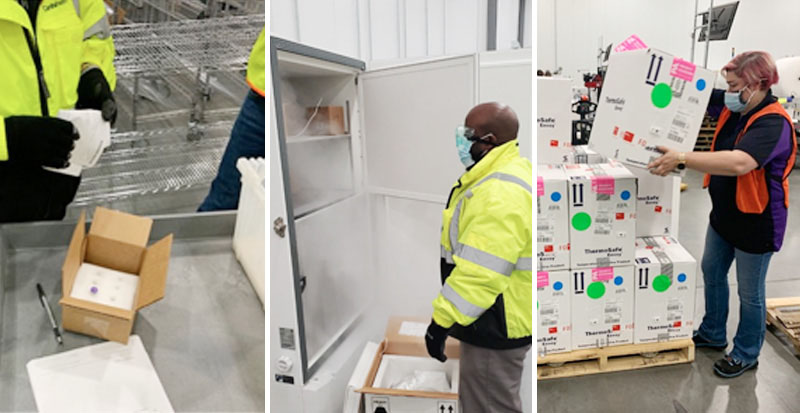Cardinal Health MarketSM
The legacy Cardinal.com Medical Ordering site has been replaced with Cardinal Health MarketSM, a new product experience designed with you in mind.

05/25/2021
Patients with end-stage kidney disease are often in fragile health, and because of their weakened immune systems, they are at high risk of becoming severely ill from COVID-19. Yet, until recently, many patients on dialysis, particularly those in rural communities, struggled to access COVID-19 vaccines.
In March 2021, the Biden Administration announced it would provide COVID-19 vaccinations to people receiving dialysis in outpatient clinics. While this was welcome news for U.S. Renal Care (USRC) – one of the largest dialysis organizations in the nation – distribution was a logistical challenge.
First, the USRC team realized the vaccine shipments were too large: The available Pfizer vaccines were packaged in trays with a minimum of 1,170 vaccine doses – far too many for dialysis clinics that care for an average of 60-80 patients a week, and even fewer patients in rural communities.
Initially, USRC planned to manage the challenge internally. “We were going to distribute the vaccines ourselves, using regional hubs, but we didn’t have the ultra-low temperature freezers needed to store the vaccines, or the capabilities to manage the last mile delivery from our hubs to the clinics,” said Peter Luff, Director of Business Transformation at USRC.
That’s where Cardinal Health came in. USRC reached out to our Metro Medical team – USRC’s long-standing distribution partner – to ask if they could orchestrate a cold-chain pack-out distribution process, in which the large vaccine shipments would be separated into smaller parcels and shipped at a controlled temperature to USRC clinics around the country.
Working together, the companies delivered more than 500 vaccine shipments to 228 clinics, so 5,500 kidney care patients, their caregivers and members of the local community could be vaccinated. Coordinating with the vaccine manufacturer, the Centers for Disease Control and Prevention (CDC) and DaVita (the network administrator for dialysis centers), Cardinal Health developed a cold-chain solution and shipped the first vaccines to USRC clinics just 19 days after the idea was proposed.
“We created new packaging materials for individual vaccine vials, and a special cold-chain shipping container that allowed the ultra-low temperature vaccine to be packaged in the same parcel with the related medical supplies, such as syringes and vaccine cards, so the clinics would have everything they needed in one shipment,” said Brian Bejarano, Vice President of Supply Chain at Cardinal Health. “Reducing the number of shipments meant both greater convenience and cost savings for USRC.”
Cardinal Health also partnered with FedEx to ensure the vaccine shipments were given priority alert status, guaranteeing a higher level of quality oversight and tracking throughout the delivery process.
“Dialysis patients are more likely to be hospitalized if they contract Covid-19, and are more likely to face mobility and transportation challenges, which can make accessing vaccines difficult,” said Chris Mahoney, Director of Renal Sales for Cardinal Health. “We were pleased to partner with USRC to deliver life-saving vaccines to this vulnerable population.”
USRC leaders said the program enabled them to fulfill their commitment to the health of patients with kidney disease.
“There is no way we could have vaccinated so many patients without the help of Cardinal Health,” said Anna Stella, Vice President of Operational Excellence at USRC. “Not only did their partnership and collaboration allow us to reach more patients with the vaccine, it allowed healthcare providers in our clinics to really focus on our patients.”
Based on the success of the program, Cardinal Health will begin working with other dialysis organizations on similar processes for delivering vaccines to their clinics. In total, Cardinal Health expects to ship COVID-19 vaccines to more than 1,000 dialysis clinics before the end of the summer.